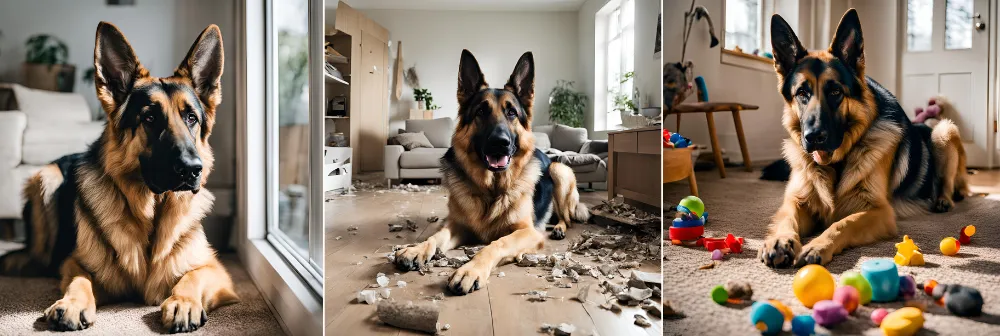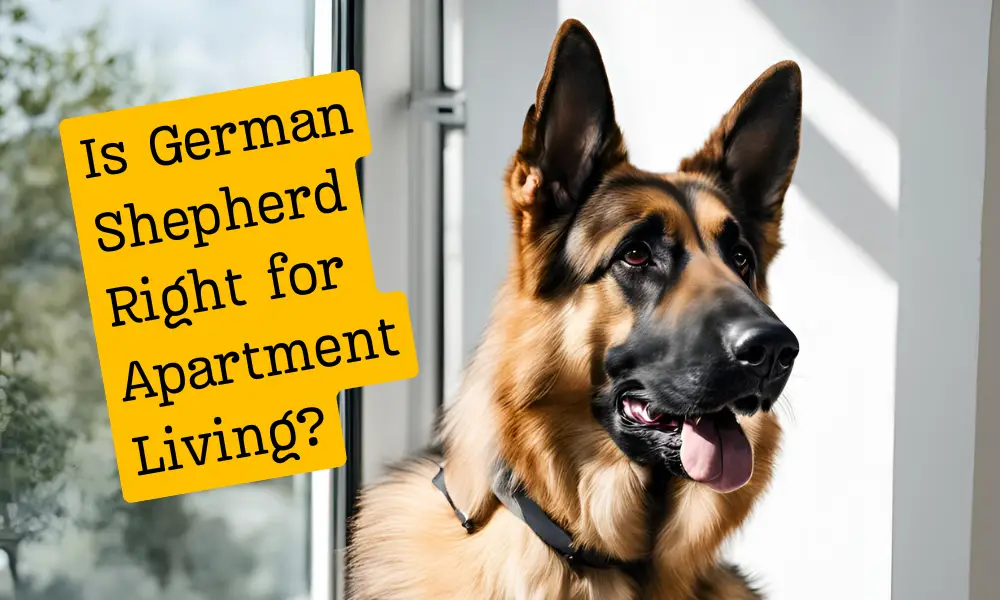Choosing a dog breed that fits your lifestyle and living situation is essential for both you and your dog’s well-being. For those considering the German Shepherd, an intelligent, loyal, and energetic breed, it’s natural to think how they’ll adapt to apartment living.
The answer isn’t a simple yes or no; rather, it depends on your ability to meet their unique needs.
This article will cover essential considerations about German Shepherds in apartments, including their exercise requirements, temperament, potential challenges, and tips for success.
Topics
- Understanding the German Shepherd’s Needs
- Assessing Apartment Size and Layout
- Noise Considerations
- The Importance of Routine and Consistency
- Preparing for Potential Challenges
- Practical Tips for Apartment Living with a German Shepherd
RELATED
- Effective Methods for Crate Training German Shepherd Puppy
- Monthly & Annual Expenses of Owning a German Shepherd
- A Guide for Raising German Shepherd Puppy at Home
- How to Determine the Age of German Shepherd Puppy or Dog
- How to Know German Shepherd Puppy is Male or Female | Gender
- Training German Shepherds for Families With Young Children
- Common German Shepherd Health Myths Debunked
- How to Tell if German Shepherd Feels Comfortable Around You
|| DON’T MISS! Today’s Deals on Chewy – Pet Foods, Products, Supplies, Toys and more. Additionally, visit our Etsy & Online Store for German Shepherd merchandise.
01. Understanding the German Shepherd’s Needs
German Shepherds are one of the most popular breeds worldwide, top-rated for their intelligence, loyalty, and versatility.
Originally bred as working dogs, German Shepherds thrive on mental stimulation and physical exercise. Whether for herding or police work, they are accustomed to having a purpose and need active involvement to stay content.
Energy and Activity Requirements
German Shepherds are highly energetic, needing about 1-2 hours of exercise daily. Without ample physical and mental stimulation, German Shepherds may develop behavioral issues such as barking, chewing, and even aggression due to pent-up energy.
Apartment living can work for a German Shepherd if you can commit to meet these exercise and mental stimulation needs.

Mental Stimulation
In addition to physical exercise, German Shepherds require regular mental stimulation. Training sessions, puzzle toys, obedience practice, and interactive play are crucial. With their high intelligence, they can quickly become bored if left with nothing to do, making this aspect especially important in an apartment setting.
02. Assessing Apartment Size and Layout
German Shepherds are large dogs, typically weighing between 50-90 pounds and standing 22-26 inches tall. Space is a consideration, as they need room to move around comfortably, even indoors.
Living Space
While German Shepherds can adapt to smaller living spaces, it’s essential to ensure that the apartment layout allows them some room to roam. Open layouts with fewer barriers and obstacles are ideal. A German Shepherd that feels cramped or confined may be more prone to anxiety or frustration.
RELATED
- Male or Female German Shepherd: Which One is Better?
- How to Know German Shepherd Breeder is Genuine?
- Understanding the Prey Drive of German Shepherds
Access to Outdoor Spaces
While not a strict requirement, having a balcony or patio can give your German Shepherd a place to get fresh air without always needing to leave the apartment. Some pet-friendly buildings also offer dog parks or walking areas nearby, which can significantly improve your German Shepherd’s apartment life.

03. Noise Considerations
German Shepherds are known to be protective and can be vocal if they sense potential threats. In apartments with shared walls, neighbors might be disturbed by frequent barking. Training your dog to be calm and less reactive to everyday noises can help manage this behavior.
One way to manage this potential issue is by working on desensitization training. Teaching your German Shepherd to ignore normal hallway sounds or distant voices can reduce their reactionary barking. Starting this training early can make a huge difference.
04. The Importance of Routine and Consistency
German Shepherds thrive with structure, so maintaining a consistent schedule is key to their happiness and well-being.
Daily Walks and Playtime
A German Shepherd living in an apartment needs a regular schedule that includes exercise, feeding, bathroom breaks, and playtime. Try to schedule multiple walks per day, ideally including one long walk or run and a few shorter bathroom breaks.
RELATED
- Best Way to Take German Shepherd for Walk: A Complete Guide
- Regular or Retractable Leash! Best for German Shepherds?
Set Aside Quality Time
Beyond walks, spend time with your German Shepherd in interactive ways that stimulate them mentally and physically. Obedience training, agility exercises, or even advanced tricks are great ways to keep your dog’s mind active.
RELATED
- What are Challenges of Training & Raising German Shepherd?
- How to Determine Most Desirable Traits in German Shepherd?
- How to Give German Shepherd a Bath: A Complete Guide
05. Preparing for Potential Challenges
Living in an apartment with a German Shepherd is possible, but it does come with challenges. Acknowledge potential issues and plan ways to address them.
Dealing with Separation Anxiety
German Shepherds form strong bonds with their owners and may experience separation anxiety when left alone for long periods. This can lead to destructive behavior if they feel stressed or bored. Make sure you should not leave him alone for long periods, and to address this, provide enrichment toys, or use calming techniques when you’re away.

Managing Shedding and Cleanliness
German Shepherds shed heavily, especially during seasonal changes. Regular grooming and vacuuming are necessary to keep the apartment clean.
Additionally, some landlords may have breed restrictions or require additional deposits, so it’s essential to check your apartment’s pet policy before bringing a German Shepherd into your home.
06. Practical Tips for Apartment Living with a German Shepherd
Here are a few actionable tips for ensuring your German Shepherd stays happy and healthy in an apartment:
- Regular Exercise: Commit to daily walks, runs, and playtime.
- Mental Stimulation: Use puzzle toys, obedience training, and interactive games.
- Training for Calmness: Teach them to stay calm around noises to minimize barking.
- Pet-Friendly Amenities: Look for dog parks, green spaces, or dog-friendly trails nearby.
- Grooming Routine: Regularly groom your dog to manage shedding.
- Consider Professional Help: If needed, consider hiring a dog walker or trainer, especially during busy periods.
Conclusion
While German Shepherds are not the typical “apartment dog” they can adapt to apartment life if their owners are committed to provide adequate exercise, mental stimulation, and training. By understanding and addressing their unique needs, you can create a fulfilling, balanced lifestyle for both you and your German Shepherd even within the confines of an apartment.
If you like this post then don’t forget to share with other people. Share your feedback in the comments section below.
Also Read
- Is White German Shepherd a Good Family Dog?
- How to Spot a Fake German Shepherd Puppy | 10 Tips
- Slant Back German Shepherds | Types of Showline GSDs
- Straight Back German Shepherds | Types of Working Line GSDs
- Role of German Shepherds in Therapy & Emotional Support




Leave a Reply